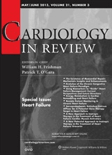
Cardiology in Review
Scope & Guideline
Advancing cardiovascular knowledge for a healthier tomorrow.
Introduction
Aims and Scopes
- Clinical Innovations and Treatments:
The journal emphasizes novel treatment approaches and technologies in cardiology, including both pharmacological and non-pharmacological interventions. This includes a focus on innovative surgical techniques, device therapies, and the application of new medications. - Epidemiology and Risk Factors:
'Cardiology in Review' addresses the epidemiological aspects of cardiovascular diseases, exploring risk factors, trends, and their implications for public health. This encompasses studies on the prevalence of diseases, their associations with other health conditions, and demographic impacts. - Pathophysiology and Mechanisms of Disease:
A significant focus is on understanding the underlying mechanisms of cardiovascular diseases, including genetic, molecular, and physiological factors. This contributes to better diagnostic and therapeutic strategies. - Systematic Reviews and Meta-Analyses:
The journal frequently publishes systematic reviews and meta-analyses, which synthesize existing research findings. This approach provides a comprehensive overview of current knowledge and highlights gaps in the literature. - Interdisciplinary Perspectives:
The journal incorporates interdisciplinary approaches, recognizing the interconnectedness of cardiovascular health with other medical fields such as nephrology, endocrinology, and infectious diseases. This broadens the scope of cardiovascular research.
Trending and Emerging
- Impact of COVID-19 on Cardiovascular Health:
A significant increase in studies addressing the cardiovascular implications of COVID-19, including its effects on patients with pre-existing conditions and the management of cardiac complications post-infection. - Integration of Technology in Cardiology:
Emerging themes focus on the use of technology, including telemedicine, mobile health applications, and remote monitoring devices, which have gained traction in the management of cardiovascular diseases. - Personalized and Precision Medicine:
There is a growing emphasis on personalized treatment approaches, with studies exploring genetic and molecular profiling to tailor cardiovascular therapies to individual patients. - Long-term Outcomes and Quality of Life in Cardiac Patients:
Recent publications are increasingly focusing on long-term outcomes and the quality of life of patients with cardiovascular diseases, highlighting the importance of holistic care beyond immediate clinical interventions. - Chronic Disease Management and Multimorbidity:
Research is trending towards understanding the management of cardiovascular diseases in the context of multimorbidity, exploring how cardiovascular health intersects with other chronic conditions.
Declining or Waning
- Traditional Risk Factor Models:
Research focusing solely on traditional cardiovascular risk factors (e.g., cholesterol, hypertension) appears to be waning as newer studies emphasize more complex interactions and novel biomarkers. - Static Surgical Techniques:
Papers centered around established surgical techniques without innovation are becoming less common, as the field shifts towards minimally invasive and technologically advanced procedures. - Basic Pharmacological Studies:
There is a noticeable decline in the publication of studies examining basic pharmacological properties of medications, with a greater emphasis on clinical outcomes and real-world effectiveness of treatments. - Aging Population Studies:
While still relevant, the focus on aging populations and their unique cardiovascular challenges has decreased, possibly due to the increasing interest in acute and emergent cardiovascular conditions. - Generalized Guidelines for Cardiovascular Disease Management:
The journal has seen a reduction in articles that merely reiterate existing guidelines without providing new insights or evidence, as the emphasis shifts toward personalized medicine and individualized treatment strategies.
Similar Journals
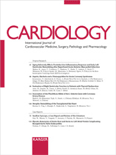
CARDIOLOGY
Connecting researchers to the pulse of cardiovascular health.CARDIOLOGY, published by KARGER, is a renowned scholarly journal dedicated to the advancement of research in the fields of cardiology and cardiovascular medicine. Since its inception in 1937, the journal has consistently provided a platform for high-quality, peer-reviewed articles that contribute to the understanding and treatment of heart and vascular diseases. With an impressive convergence through 2024, CARDIOLOGY holds a respectable Q2 ranking in both the Cardiology and Cardiovascular Medicine and Pharmacology (medical) categories, placing it within the 53rd and 45th percentiles of respective Scopus ranks. Based in Switzerland, the journal serves as an essential resource for researchers and practitioners aiming to stay abreast of cutting-edge developments and evidence-based practices in cardiovascular health. While it currently does not offer open access options, its commitment to rigorous scientific standards solidifies its significance within the academic community. We invite readers to explore the latest research findings and contribute to this vital field through publications in CARDIOLOGY.

Revista de la Federacion Argentina de Cardiologia
Driving progress in cardiovascular research and practice.Revista de la Federacion Argentina de Cardiologia is a vital publication in the field of Cardiology and Cardiovascular Medicine, providing a platform for researchers and healthcare professionals to share significant findings and innovative concepts since its inception in 2012. Published by the Federacion Argentina Cardiology, this journal specifically addresses contemporary issues and advancements within cardiology, contributing to the scholarly dialogue essential for improving cardiovascular health. Despite being categorized in the Q4 quartile for 2023 and presently ranking #358 out of 387 in its field, the journal remains committed to fostering academic inquiry and disseminating valuable research for both local and global audiences. Although it is not an open-access journal, it strives to balance accessibility with rigorous academic standards, ensuring quality contributions that are critical for practitioners and students alike. The journal’s ongoing evaluation and adaptation in the ever-evolving landscape of cardiology underscore its importance in advancing cardiovascular science and practice.

Journal of Atherosclerosis and Thrombosis
Advancing cardiovascular knowledge for a healthier future.Journal of Atherosclerosis and Thrombosis is a leading academic publication dedicated to advancing research in the fields of cardiovascular medicine, biochemistry, and internal medicine. Published by the Japan Atherosclerosis Society, this esteemed journal operates from its headquarters in Tokyo, Japan, and has been a vital resource in its area since its inception in 1994. With its robust impact in Cardiology and Cardiovascular Medicine, ranking in the top quartile (Q1) as of 2023, and a commendable standing in Internal Medicine and Biochemistry, the journal fosters an environment of innovation and discovery, showcasing significant studies and advancements that shape clinical practices and therapeutic approaches. Though not an open-access publication, it offers a wealth of insights to researchers, professionals, and students seeking to deepen their understanding of atherosclerosis and thrombosis. By continually featuring high-quality articles, the Journal of Atherosclerosis and Thrombosis plays an essential role in bridging the gap between research and practice, facilitating critical conversations that influence the future of cardiovascular health.

CJC Open
Empowering research, enriching cardiovascular health.CJC Open is a leading open access journal published by Elsevier, focused on advancing the fields of Cardiology and Cardiovascular Medicine. Since its inception in 2019, the journal has committed to disseminating high-quality research and groundbreaking advancements in cardiovascular health. With its ISSN 2589-790X and an impressive Q2 ranking in its field, CJC Open aims to foster collaboration and communication among researchers, healthcare professionals, and students by providing a platform for innovative studies, reviews, and insights. The journal is indexed in Scopus, currently ranking at #191 out of 387 in its category, underscoring its relevance and impact in the academic community. As an open access journal, CJC Open ensures that research findings are widely available, promoting greater visibility and readership. Scientists and practitioners alike are encouraged to submit their work, further enriching the discourse in cardiovascular research. With a focus on quality and accessibility, CJC Open is poised to make significant contributions to the field through 2024 and beyond.
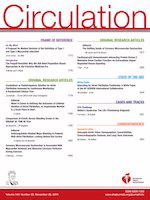
CIRCULATION
Elevating Cardiology: Where Innovation Meets Excellence.CIRCULATION is a premier journal in the field of cardiology and cardiovascular medicine, published by Lippincott Williams & Wilkins. With a distinguished history dating back to 1950, the journal has consistently been at the forefront of critical research, showcasing significant advancements and discoveries in cardiovascular health. It holds a remarkable Q1 ranking in both the fields of Cardiology and Physiology (medical) according to the 2023 category quartiles, demonstrating its influential role among the top publications in these disciplines. With an impressive Scopus ranking, placed 3rd out of 387 in Cardiology and 2nd out of 113 in Physiology, CIRCULATION is essential reading for researchers, practitioners, and students passionate about advancing their understanding of heart health and related medical sciences. Although the journal is not open access, it continues to foster scholarly exchange and innovation in cardiovascular research, making it an indispensable resource for quality insights and groundbreaking studies.

Cardiology Research
Elevating heart health through rigorous scientific inquiry.Cardiology Research is a prominent open-access journal dedicated to advancing the field of cardiology and cardiovascular medicine, published by ELMER PRESS INC. Renowned for its rigorous peer-review process, the journal provides a platform for cutting-edge research and innovative clinical practices in cardiology. With an ISSN of 1923-2829 and an E-ISSN of 1923-2837, it has established an impactful presence in the academic community, achieving a 2023 Scopus quartile ranking of Q3 in its category, positioning it in the 41st percentile. The journal's scope encompasses various aspects of cardiology research, including but not limited to epidemiology, diagnostics, therapeutics, and cardiovascular interventions. Although it operates without open access in certain contexts, it provides flexible access options for readers, ensuring that its valuable insights are widely disseminated. Cardiology Research is an essential resource for researchers, healthcare professionals, and students who aspire to stay at the forefront of cardiovascular science, contributing significantly to the global discourse on heart health.
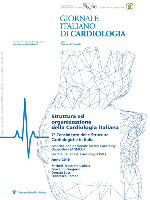
Giornale Italiano di Cardiologia
Fostering Dialogue for a Healthier HeartGiornale Italiano di Cardiologia is a premier journal in the field of cardiology, published by PENSIERO SCIENTIFICO EDITORE. Established in 1996, this journal serves as an essential platform for sharing the latest research and clinical advancements in cardiovascular medicine, particularly catering to the Italian and international medical communities. Although currently classified in the Q4 quartile for Cardiology and Cardiovascular Medicine (2023), the journal strives to enhance its impact and outreach by embracing rigorous peer-review practices and promoting high-quality submissions. With a commitment to enriching knowledge and fostering dialogue among researchers, clinicians, and students, the journal offers a collection of articles that include original research, reviews, and case studies. While currently not an Open Access publication, readers will benefit from a wealth of research insights that contribute to advancements in cardiac care and treatment strategies. As the Giornale Italiano di Cardiologia continues to evolve, it plays a vital role in bridging research and clinical practice in the cardiovascular domain.

VASCULAR MEDICINE
Transforming research into practice for superior vascular care.Vascular Medicine is a premier academic journal for researchers and practitioners in the field of cardiovascular health, published by SAGE Publications Ltd. With an ISSN of 1358-863X and E-ISSN 1477-0377, this esteemed journal has been at the forefront of publishing quality research since its inception in 1992, with convergence extending to 2024. Ranked in the Q2 category for both Cardiology and Cardiovascular Medicine as well as for miscellaneous Medicine in 2023, it is recognized for its significant contributions to advancing knowledge and clinical practice within these domains. Its Scopus ranking situates it at #91 out of 387 in the field, reflecting its high impact and the relevance of its published research, which is crucial for addressing the challenges in vascular health today. Although it is not an open-access journal, Vascular Medicine remains dedicated to disseminating vital findings that bridge the gap between research and clinical application, making it an essential resource for medical researchers, healthcare professionals, and students alike.

Heart International
Connecting researchers and clinicians in the pursuit of heart health.Heart International is a prominent open-access journal dedicated to the fields of cardiology and cardiovascular medicine, published by TOUCH MEDICAL MEDIA LTD since 2006. Based in Italy, this journal serves as a vital platform for researchers, clinicians, and students, aiming to disseminate cutting-edge scientific findings and clinical insights that advance the understanding of heart health. With an ISSN of 2036-2579 and an emphasis on accessible content, Heart International ensures that valuable research is available to a wide audience, thereby contributing to the global discourse on cardiovascular issues. Although it currently holds a Q4 quartile ranking in its category and is positioned in the lower percentile for Scopus rankings, the journal is committed to improving its impact through rigorous peer review and high-quality publications. The journal covers a wide array of topics within the cardiology domain, making it an essential resource for those looking to stay abreast of the latest developments in heart research.
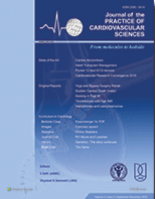
Journal of the Practice of Cardiovascular Sciences
Empowering Research, Transforming Cardiovascular PracticesJournal of the Practice of Cardiovascular Sciences, published by Wolters Kluwer Medknow Publications, is an esteemed Open Access journal dedicated to advancing knowledge in the field of cardiovascular health. With its ISSN 2395-5414 and E-ISSN 2454-2830, the journal serves as a vital platform for researchers, healthcare professionals, and students to disseminate and access high-quality studies, innovations, and practical applications related to cardiovascular sciences. Established in 2015 as an Open Access journal, it promotes widespread sharing of insights to enhance cardiovascular practices and address contemporary challenges in the field. As part of a reputable publishing group, the journal is poised for growth and impact, contributing significantly to the ongoing dialogue in cardiovascular research and clinical practice.